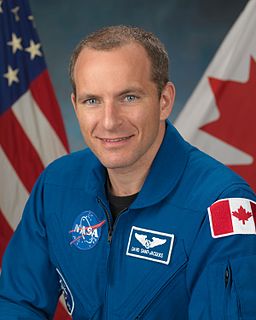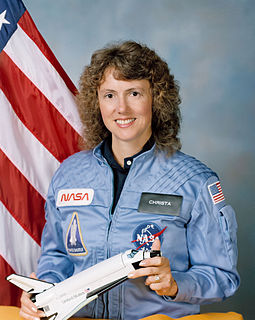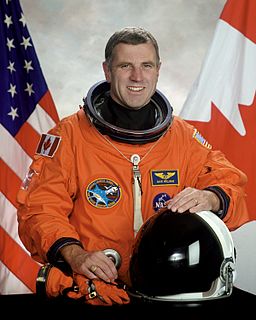A Quote by Leroy Chiao
The Americans are still the leaders in human space flight. I feel we have a danger here of kind of stagnating. We're kind of resting on our laurels and there's a danger going forward if we don't take bold steps to really support human space flight in this country that we could fall behind. After the space shuttle is retired, we're going to have a big gap, five to seven years, at least where we're not going to have the ability to send our own astronauts into space, we'll have to buy rides on the Russian Soyuz, and so that will be a pretty big step down for us.
Quote Topics
Ability
After
Astronauts
Behind
Big
Bold
Buy
Could
Country
Danger
Down
Fall
Feel
Five
Flight
Forward
Gap
Going
Human
Kind
Laurels
Leaders
Least
Our
Own
Pretty
Really
Resting
Retired
Rides
Russian
Send
Seven
Seven Years
Shuttle
Space
Space Flight
Space Shuttle
Step
Steps
Still
Support
Take
Us
Will
Years
Related Quotes
There's a huge amount of pressure on every astronaut, because when you get right down to it, the experiments that are conducted on a space flight, or the satellites that are carried up, the work that's to be done, is important and expensive work, and you are up there for a week or two on a Space Shuttle flight. The country has invested a lot of money in you and your training, and the Space Shuttle and everything that's in it, and you have to do things correctly. You can't make a mistake during that week or two that you're in space.
Half of one per cent of the U.S. budget is space-related stuff. In Canada, we spend more on dog foodScreen Shot 2015-08-19 at 2.39.35 PM. Space flight is intrinsically international and very modern. It's like a co-op. Every country provides services. In Canada, we have a focus on robotics in the shuttle and space station. In exchange, we get research time for our scientists and astronauts' flights. Our contribution is as a junior partner.
We were trying to do as much science as we could because that was the main purpose of the international space station. But without the shuttle to bring up heavy laboratory equipment and bring back samples, we were limited by what we could do, but I was proud that we actually accomplished more science that was planned for the flight. And I got a chance to do two Russian spacewalks on that flight, I had become an expert in U.S. spacewalks and using U.S. suits and techniques, and this was a chance to put on a Russian Orlan suit and do two construction space flights outside of the space station.
I attended a big human space flight conference in Beijing and I was going as myself. And really, there weren't any NASA astronauts there, I was the only so-called American Astronaut there. We had astronauts from most of the other countries, certainly from Russia, from France, from Japan, several other countries, but it was a little bit odd because here we are at an international gathering of a lot of astronauts and I'm talking about somewhere upwards of 30 or so astronauts, and I'm the only American. And I wasn't even there in an official capacity.
On my second space walk, I was riding the Canadarm, heading down toward the payload bay of the space shuttle, and I could see the space shuttle highlighted against the Earth in the background, and there was this black, infinite, hostile void of space. I remember looking down at the Earth and thinking, "Beneath me is a 4½-billion-year-old planet, upon which the entire history of the human species has taken place." That was an incredibly humbling moment, and I had a bit of an epiphany.
The space station mission was kind of the culmination of all of my experience of being a NASA Astronaut, so it had brought all of my previous experience into play. I had to learn the Russian language to a fluent level so that I could function as the co-pilot of the Soyuz Spacecraft that we flew up and back from the space station. And then the challenge of being the Commander of the whole expedition, a six and a-half month flight aboard the international space station. I felt the burden of the whole mission on my shoulders, which was fine, and fortunately everything did go well.
The United States, Russia, and China are the only three countries in the world that can launch astronauts into space. Mostly in the U.S. you see some companies trying to launch private commercial people into space, but nobody's done it yet. The only private vehicle that's made it into space so far is Spaceship 1 in 2004, and that was an effort that was funded by one of the Microsoft founders, and he spent about $20 million to develop this spacecraft to do a sub-orbital flight. And it's not the same as going into orbit, but it was a huge first step.
Everyone who's been in space would, I'm sure, welcome the opportunity for a return to the exhilarating experiences there. For me, a flight in a shuttle, though most satisfying, would be anticlimactic after my flight to the moon. Plus, if I pursued a flight myself, people would think that was the reason I am trying to generate interest in public spaceflight. And that's not the purpose - I want to generate interest in long-range space exploration.
In 2009 I went up on the space shuttle. I was in space for 16 days and docked at the space station for 11 days. The entire crew did five space walks, of which I was involved with three of them. When you're doing a space walk, you always have a buddy with you. It's a very dangerous environment when you're doing a space walk.


























